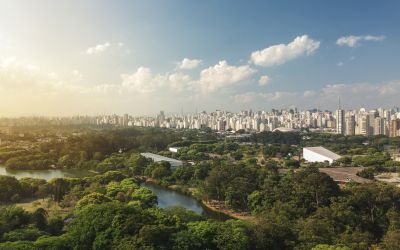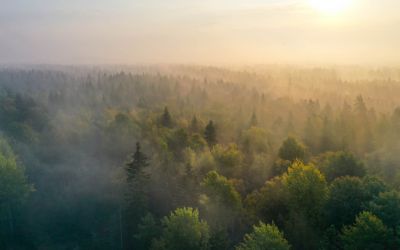Dave Bircher on the importance of local knowledge and leadership to ensure resilient outcomes
Dave Bircher, Director of Growth at WeForest, spoke to Climate Action in the lead up to the Nature Finance Forum Europe, taking place on April 28th in Paris.
.png)
With over 15 years of experience across fundraising, NGO leadership, and cross-sector strategy, David leads WeForest’s global growth efforts—bringing together fundraising, partnerships, communications, and organizational strategy. Based in Paris, he believes deeply in the power of the third sector to bridge the public and private sectors in delivering real impact. With degrees in Public Policy (LSE) and International Management (ESCP), David has mobilized over €100 million in blended financing for innovative social and environmental solutions.
What are the biggest barriers to scaling nature-positive investments, and how can they be overcome?
The biggest barrier is the enormous funding gap—it's massive. Yet, effective nature restoration almost always occurs at the local level, where communities take the lead. Bridging that gap between vast funding needs and small-scale, community-driven action is tough. Too often, layers of intermediaries dilute impact and disconnect finance from reality on the ground. We need simpler, clearer pathways for investment—transparent, understandable, and built explicitly to amplify community-led efforts.
This is where I find Elinor Ostrom’s work on the commons incredibly relevant. I first read her during my graduate studies, and her research continues to shape how I think about this challenge. Her work demonstrated that shared resources—like forests—are often best managed by the communities closest to them. The evidence is there. If we want long-term, resilient outcomes, we need to support governance models and financial mechanisms that genuinely center local knowledge and leadership.
What policy changes are needed to unlock greater private-sector investment in biodiversity and ecosystem services?
Policy needs to start from ethical clarity—a clear moral scaffolding. Rather than simply offering incentives, we should first define our end goal: what does a just and sustainable relationship with nature look like? Once that's clear, policy frameworks can be designed backwards from this shared vision. Practical steps could include incentives clearly tied to measurable biodiversity outcomes and governance structures ensuring communities meaningfully shape, participate in, and benefit from investments. Right now, beyond numeric targets, I'm not sure we've collectively defined that human-level goal—and that's a conversation policy urgently needs to facilitate.
What is your organisation prioritising as we look towards COP30 in Belem?
At COP30, WeForest is coming in loud and proud as the nerds in the room - advocating for our commitment to science-based restoration solutions. COP began fundamentally as a scientific gathering and has since broadened significantly. That evolution isn't inherently negative, but it is essential science remains central to credible climate action. We’re committed to showing how rigorous scientific research, verified methodologies, and deep partnerships with research institutions translate into real-world outcomes. We’re not marketing solutions—we’re building and delivering them, hand-in-hand with the communities who depend on them.
What are you most looking forward to discussing or hearing about at the Nature Finance Forum Europe?
I'm genuinely excited to learn from people. For me, this whole conversation—about finance, about nature—is really about people. Finance is people. Nature is being destroyed by people—and it’s being restored by people too. That human dimension is everything.
I'm especially interested in how others are thinking about "mission and market." How do we build financial mechanisms that serve a purpose—real outcomes for ecosystems and communities—while also functioning in a world that still demands returns? I'm definitely not opposed to profit. I'm just deeply interested in not perpetuating the current profit cycle—where those profits go and who they serve. They need to become more circular through reinvestments in new projects, capacity, local agency, and regenerative systems that build long-term resilience.
Together, let’s go beyond the limits holding us back from concrete and effective solutions, and creating shared values.






